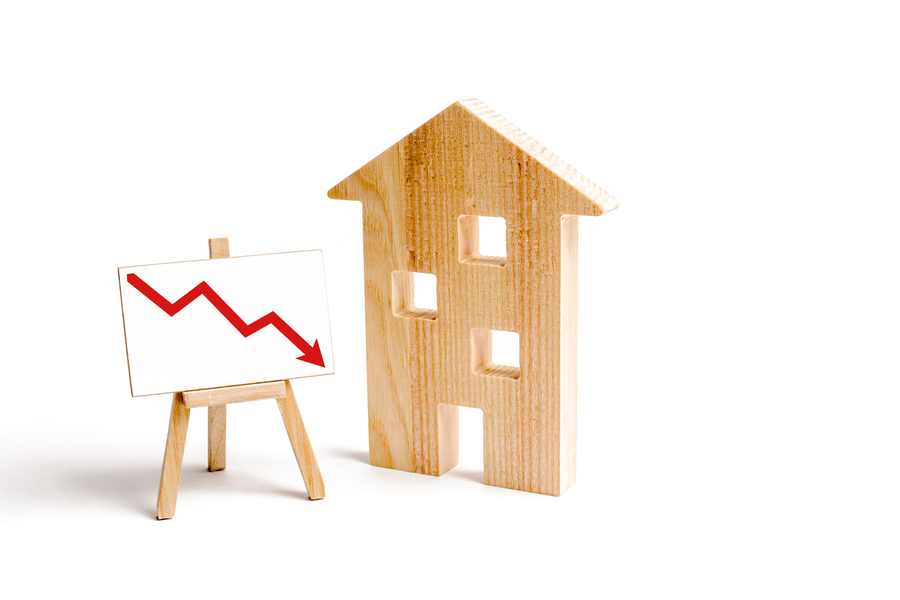Canada’s real estate market stayed strong over the course of the pandemic, driven by rock-bottom rates from the Bank of Canada. Now that the pandemic is winding down, and inflation is at all-time highs, rate hikes are beginning to cause a slowdown in the real estate market.
Since housing is traditionally a solid form of investment, many Canadians purchased land, housing, or other real estate assets during a period of high confidence. Now that the confidence is coming to an end, many recent buyers are coming to regret their decisions.
Keep reading to see details about the state of housing prices in Canada, as well as information on widespread buyer’s remorse gripping the market as it continues to fall.
Falling Housing Prices Across Canada
When home markets are balanced and price rises are minimal, brokers can often persuade buyers and sellers that they are making the right choice. But when drops in house values are seen in a short amount of time, such as those seen since February, this is more challenging.
The large rise in housing prices during an extended period of low rates was an ominous portent of an incoming price decline. Many economists foresaw a steep downturn when the BoC began increasing rates to combat inflation.
Mark Morris, a Toronto real estate lawyer, stated that today’s real estate pricing forces people to go all in. When people go all in and suddenly realise that their bet wasn’t as smart as they thought, they’re probably going to do whatever they can to get out.
Real Estate Market Slowdown Causing Buyer’s Remorse
The heated real estate markets seen across Canada during the pandemic caused a slowdown in overall listings, even as prices continued to rise. Unfortunately, this bubble activity seems to have caught up to the market as prices in many areas have been slowly falling for months.
Today’s real estate prices are only remaining high in metropolitan areas such as Toronto and Vancouver. However, even these markets have seen a bit of volatility in recent months as downward pressure seems to be getting the best of the market.
Real estate professionals expect the downturn to continue through 2023 and possibly even into the first couple of quarters of 2024. These statements aren’t doing much to dissuade feelings of regret that most buyers are feeling after getting in near the top.
Markets More Volatile In Major Metropolitan Centres
In the last six months, RE/MAX has also observed a reversal in previous patterns as work-from-home arrangements shift and consumers reconsider their flights to suburban and rural locations.
These changes are driving strong prices to remain in metropolitan centres such as Toronto and Vancouver, even as prices in other areas continue to fall. For people that got in near the top of the bubble only a few months ago, buyer’s remorse is likely unavoidable.
Some current sellers have taken advantage of this chance to trade up to bigger properties or more coveted neighbourhoods closer to the city. The gap between the market price of a new home and the selling price of an existing one has shrunk significantly.
Affordability Not Expected To Improve
Comparing July to the same month last year, inflation is up 7.6% in Canada. Although it was the first month-to-month decrease since 2021, Canadian budgets are still being squeezed by the cost of living, and many are looking to politicians for assistance.
While housing prices started dropping back in February, many Canadian households are still priced out of the housing markets in their area. It will take a long time before home prices fall enough to come into the affordable range for median-income Canadians.
The federal government has unveiled new initiatives targeted at addressing the affordability issue, such as the rental benefit and increased GST credits, as well as a new dental benefit. However, without significant changes in housing prices, this is unlikely to be enough.
72% of Home Buyers Regretting Their Purchase
According to a recent poll by Clever Real Estate, as the U.S. housing market cools, the fierce competition for homes over the last two years has left 72% of respondents regretting their home purchases.
This comes as no surprise, since buying a house is a major investment, and is normally expected to safeguard large amounts of capital in the form of home equity. People who closed protracted real estate deals only to find the prices falling likely to feel manipulated.
However, According to a recent survey by Zolo Realty, which spoke with nearly 1,200 people who purchased a property during the pandemic, the vast majority were happy with their purchase.
In fact, a surprising 63% of respondents said they “would still be happy in their property even if the real estate market dramatically decreased”. This indicates mixed feelings across several real estate markets in Canada.
What Does This Mean for Housing Prices?
Prices themselves are expected to continue falling through 2023, except perhaps in metropolitan areas such as Vancouver and Toronto. Buyer’s remorse is unlikely to have a significant effect on overall listings, even as prices in many areas continue to fall.
What Does The Canadian Real Estate Association Have To Say?
If you’re one of the many who has been eagerly anticipating the predicted fall of the outrageously hot Canadian housing market, the decline does appear to have started, according to a recent report from the CREA.
The potential of a buyer’s market is exhilarating for prospective purchasers across the province, according to BMO Chief Economist Douglas Porter, since several areas in Ontario have seen price drops in the last two months, notably in smaller cities outside of Toronto.
Final Thoughts
It’s to be expected that buyers who get into the market during a significant bubble will experience some remorse when prices begin to drop. However, the prevalence of buyer’s remorse in Canadian markets may not be as bad as some people think.
Still, prices are expected to continue falling through 2023, and possibly into the beginning of 2024. It all depends on how quickly the Bank of Canada can get a handle on the soaring inflation numbers.









